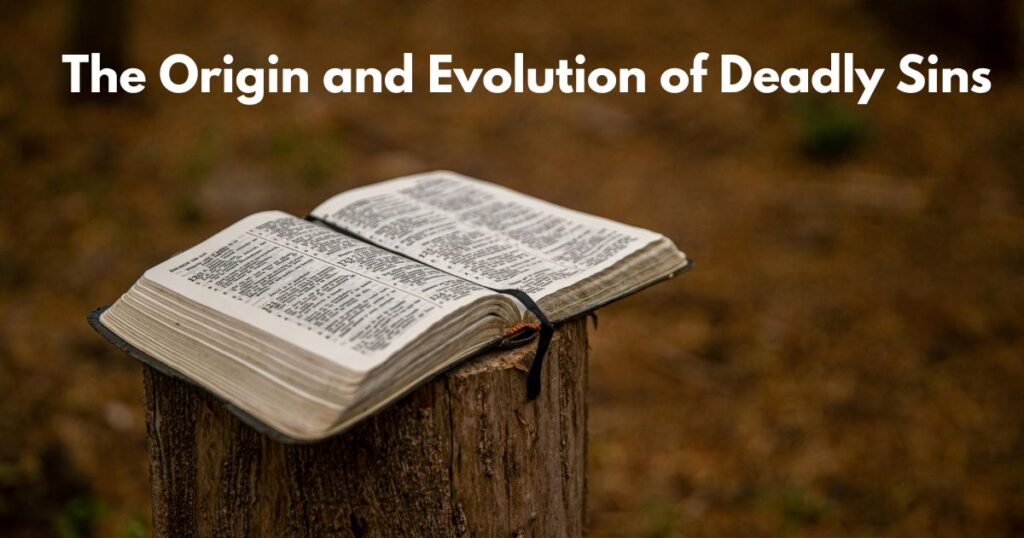Ancient wisdom still pierces through contemporary chaos. The 10 deadly sins represent more than medieval theology they’re mirrors reflecting humanity’s deepest struggles. Let’s explore this biblical moral framework and discover why these teachings remain powerfully relevant today.
Introduction to the Deadly Sins
I first encountered the list of deadly sins in Christianity through Dante’s Inferno. Those vivid descriptions haunted me. But here’s what surprised me: Scripture never explicitly lists “seven deadly sins” in one passage. Instead, the biblical definition of sin emerges through multiple texts addressing human moral corruption in Christian doctrine.
These aren’t ordinary mistakes. They’re spiritual diseases that separate us from divine law and moral guidance. Understanding sin and virtue helps us recognize patterns destroying our spiritual growth and self-reflection.
The meaning of the 10 deadly sins extends beyond religious circles. From psychology to popular culture, these concepts shape how we understand human behavior. Whether you’re a believer seeking biblical teachings on morality or someone curious about Christian moral teachings, this exploration offers practical wisdom.
The Origin and Evolution of Deadly Sins

Early Christian Desert Fathers
The origin of deadly sins traces back to Evagrius Ponticus, a 4th-century monk battling temptation in Egyptian deserts. He identified eight evil thoughts plaguing spiritual seekers: gluttony, lust, avarice, sadness, anger, acedia (spiritual apathy), vainglory, and pride.
These desert fathers weren’t theorizing. They were documenting real warfare against moral corruption.
Pope Gregory I’s Refinement
By the 6th century, Pope Gregory I consolidated these into seven cardinal sins. His Pope Gregory I deadly sins list merged sadness with sloth, creating the framework we recognize today. Gregory’s biblical interpretation of deadly sins emphasized how one vice breeds others pride spawns envy, envy fuels wrath.
This wasn’t arbitrary categorization. It reflected centuries of observing human nature through the lens of Christian doctrine.
The Expansion to 10 Deadly Sins
Lesser-known theological traditions expanded the framework. Deceit, intemperance, and vainglory emerged as distinct categories in various Christian communities. This seven deadly sins vs ten deadly sins debate continues today, though most discussions focus on the traditional seven.
Key scripture references informing these categorizations include:
- Proverbs 6:16-19: “Six things the Lord hates”
- Galatians 5:19-21: Works of the flesh
- Multiple passages from both Old Testament and New Testament teachings
What Are the 7 Deadly Sins in the Bible?
The phrase “seven deadly sins” never appears in Scripture. Yet the biblical perspective on pride, greed in the Bible, and other vices saturates both testaments.
Here’s the complete traditional list:
| Sin | Primary Scripture | Modern Manifestation |
|---|---|---|
| Pride | Proverbs 16:18 | Social media narcissism |
| Greed | 1 Timothy 6:10 | Consumer debt obsession |
| Lust | Matthew 5:28 | Pornography epidemic |
| Envy | James 3:16 | Instagram comparison syndrome |
| Gluttony | Philippians 3:19 | Overconsumption culture |
| Wrath | Ephesians 4:31-32 | Political polarization |
| Sloth | Proverbs 13:4 | Digital distraction addiction |
Why “Deadly”?
Catholic moral theology distinguishes between mortal and venial sins. Mortal sins meaning involves severing one’s relationship with God. These capital vices don’t just harm us they poison communities and corrupt souls progressively.
Sin and repentance in Christianity work together. Recognition of sin drives us toward divine forgiveness and spiritual discipline.
The 10 Deadly Sins Explored

Pride – Spiritual Arrogance
Pride represents the root of all transgression. Lucifer’s fall (Isaiah 14:12-15) illustrates how exalting oneself above God leads to destruction. The biblical perspective on pride warns: “Pride goes before destruction, a haughty spirit before a fall” (Proverbs 16:18).
Modern expressions: Personal branding obsession, refusing accountability, intellectual superiority.
Antidote: Humility recognizing our complete dependence on divine grace.
Greed – Insatiable Material Desire
Greed in Christianity extends beyond wealth accumulation. It’s prioritizing possessions over people, security over faith. Jesus warned: “You cannot serve both God and money” (Matthew 6:24).
The rich young ruler’s story (Mark 10:17-27) reveals how avarice prevents spiritual freedom. His tragic choice? Clinging to wealth instead of following Christ.
Lust – Disordered Sexual Desire
Lust and temptation scripture addresses more than physical acts. Matthew 5:28 teaches that “adultery in the heart” violates God’s design for sexuality. This isn’t prudishness it’s protecting the sacred nature of human intimacy.
Practical boundaries: Guarding eyes, establishing accountability, pursuing purity through spiritual discipline rather than sheer willpower.
Envy – Coveting Others’ Blessings
Envy and jealousy Bible verses warn against this corrosive emotion. James 3:16 states: “Where you have envy and selfish ambition, there you find disorder and every evil practice.”
Cain’s murder of Abel shows envy’s ultimate destruction. Social comparison today amplifies this ancient vice exponentially.
Gluttony – Excessive Consumption
Gluttony meaning in Christianity encompasses all overindulgence food, entertainment, possessions. Philippians 3:19 describes those “whose god is their stomach.” Our bodies are temples (1 Corinthians 6:19-20), deserving respectful stewardship.
Balance matters: Enjoying God’s gifts without worshiping them.
Wrath – Uncontrolled Rage
Wrath and forgiveness Bible teachings distinguish righteous anger from sinful rage. Jesus overturning temple tables showed justified indignation against injustice. But Ephesians 4:31-32 commands: “Get rid of all bitterness, rage and anger…forgiving each other, just as in Christ God forgave you.”
Unforgiveness imprisons us more than those we resent.
Sloth – Spiritual Apathy
Sloth and spiritual laziness extend beyond physical inactivity. Proverbs 13:4 contrasts the sluggard with the diligent. Acedia the “noonday demon” describes soul-deep indifference toward purpose and calling.
Modern epidemic: Distraction masquerading as rest, avoiding difficult growth through endless scrolling.
Deceit – Dishonesty and Falsehood
Deceit and lying in the Bible receives harsh judgment. Proverbs 12:22 declares: “The Lord detests lying lips.” Satan is called the “father of lies” (John 8:44). Ananias and Sapphira’s deaths (Acts 5) illustrate deceit’s deadly seriousness.
Truth-telling reflects God’s faithful character.
Intemperance – Lack of Self-Control
Intemperance and self-control scriptures emphasize moderation. Titus 2:12 teaches living “self-controlled, upright and godly lives.” The opioid crisis and alcoholism plague modern society partly because we’ve lost this virtue.
Self-control appears as fruit of the Spirit (Galatians 5:22-23) divine empowerment, not mere willpower.
Vainglory – Excessive Pride in Appearance
Vainglory and vanity in the Bible specifically targets seeking human praise. Jeremiah 9:23 warns against boasting in wisdom, strength, or riches. The Pharisees’ public piety (Matthew 6:1-6) exemplifies this sin.
Social media amplifies this vice through performative virtue and curated personas.
Read This Post: Understanding the 1444 Angel Number in Love
Contemporary Relevance of Deadly Sins

The contemporary relevance of deadly sins can’t be overstated. Digital age manifestations include:
- Pride: Influencer culture and follower obsession
- Greed: Cryptocurrency speculation frenzy
- Lust: Pornography accessibility destroying marriages
- Envy: FOMO driving anxiety and comparison
- Gluttony: Binge-watching replacing meaningful connection
- Wrath: Online hostility and cancel culture
- Sloth: Procrastination through endless entertainment
Overcoming Sin Through Scripture and Practical Steps
Biblical teachings on sin and virtue offer hope. Overcoming sin through scripture requires:
- Self-awareness: Identify your vulnerable areas
- Community accountability: Don’t fight alone
- Spiritual disciplines: Prayer, fasting, worship
- Grace-centered perspective: Transformation, not performance
- Tools for growth: Resources like BibleAI scripture study tool offer interactive exploration
The biblical moral framework isn’t about earning salvation it’s recognizing our need for it. Divine principles guide us toward ethical conduct and spiritual maturity.
Conclusion: From Condemnation to Liberation
Understanding the meaning of the 10 deadly sins isn’t about guilt it’s about freedom. Recognizing these patterns reveals our desperate need for something beyond ourselves.
Every person struggles with pride, greed, lust. We’ve all fallen short. But Christ died for sinners. His sacrifice covers every deadly sin. Redemption through Christian moral teachings offers genuine transformation.
Which sin will you confront today? Don’t just consume information let biblical teachings on morality transform you. As 1 John 1:9 promises: “If we confess our sins, he is faithful and just to forgive us our sins and to cleanse us from all unrighteousness.”
That’s not bad news. That’s the best news imaginable.
Explore deeper spiritual growth and self-reflection through interactive tools, study Proverbs, Matthew, James, and other biblical books, and discover how ancient wisdom applies to your life today.

Joshua is the faithful voice behind Biblegraces.com, sharing uplifting verses and spiritual insights to guide everyday life. His words inspire hope, peace, and a deeper walk with God. Through scripture and prayer, Joshua helps readers grow in faith and grace.








